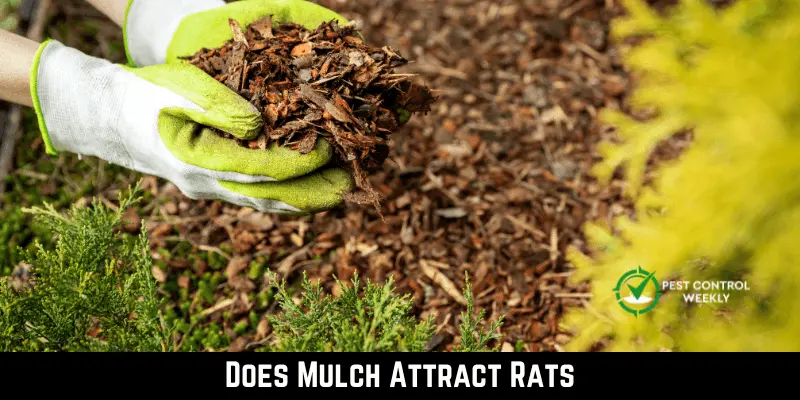It makes sense to use mulch to keep weeds under control. According to the Bulletin of the National Research Centre, mulches maintain soil moisture and nutrients, reduce weed growth, and eliminate pesticides and fertilizer residues from agricultural plants. However, does mulch attract rats?
Yes, mulches attract rats. Rats are always searching for three things: food, water, and shelter. Mulch provides moisture to rats to fulfill their thirst. They can hide under the extensive cover of mulch. Moreover, mulch can also provide nesting material to rats.
Would you like to use mulch to eradicate rats from your yard? If so, read the instructions below to understand it fully.
What Kind of Mulch Attract Rats?
A mulch is a substance spread over the soil’s surface. You can use a mulch to conserve soil moisture, improve the health and fertility of the ground, control weed growth, and enhance the area’s aesthetic appeal. Below are the basic types of mulch that attract rats.
Organic Mulch
The ingredients used to make organic mulches include compost, leaves, bark, nutshells, tree stems, and grass clippings. As all these things provide food and shelter to rats, they love to reside in them. Mulches made of organic materials are preferable to those made of inorganic materials because they raise the water content of the soil by decreasing evaporation.
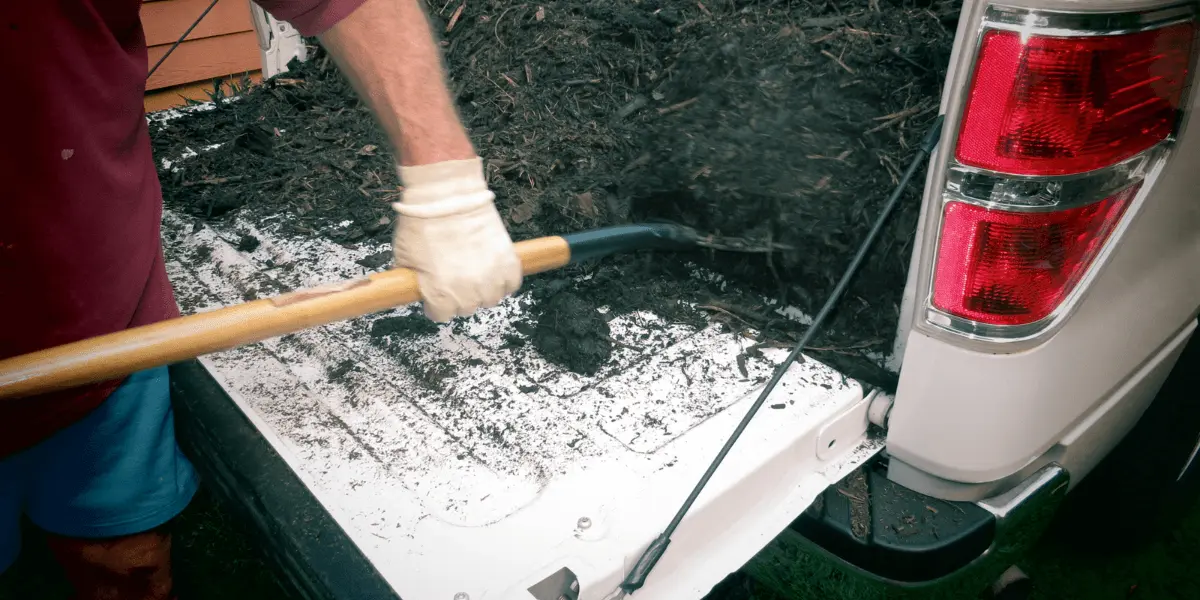
Organic mulches only last a limited time due to their capacity to rot and provide nutrients to the soil beneath them. Therefore, they must be replaced frequently as a result of their deterioration. Moreover, byproducts of its breakdown are helpful for rats to reproduce and flourish. It includes:
- Rotting horse manure
- Leaf litter
- Garden composts
- Processed woodchips
- Mushroom humus
- Rockweeds
- Inorganic Mulch
Whether created naturally or artificially, inorganic mulches come from both. Inorganic mulches do not have the same capacity for decomposition as organic mulches, so consequently, they do not enhance the quality of the soil and plants around them and don’t attract pests or rodents.
All inorganic mulch except rubber mulch attracts rats for food and shelter. Inorganic mulches typically employ in attractive landscaping. Remember, before applying inorganic mulches for landscaping, you should level the earth first away from your house. As a result, water will run off away from your building. They are of the following types:
- Fragments of volcanic rocks
- Gravel
- Pebbles
- Rubber mulch
- Landscape fabric or plastic sheeting
What Kind of Mulch Keeps Rats Away?
Although organic mulches allure rats, some help in resisting them. However, inorganic mulches work better at preventing rats from getting inside your house. Below are some mulches that you can use to keep rats away from your home:
Rubber Mulch
According to Washington State University Extension, rubber mulches are a form of discarded tires, and you can use them on landscaping. It is best for plants because it does not decompose and helps weed control.
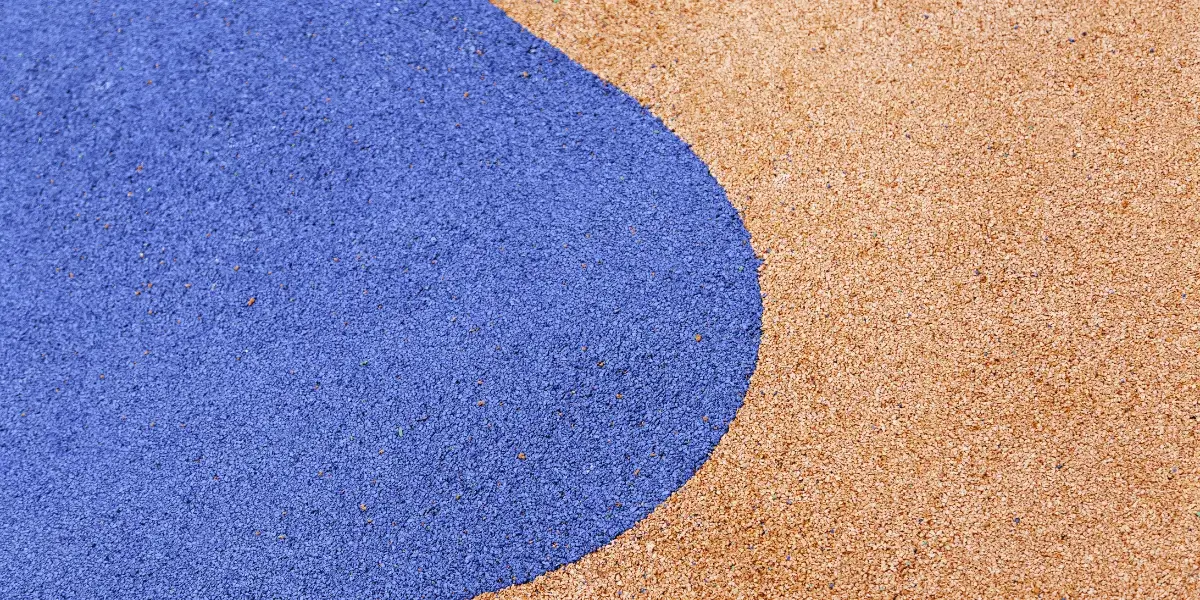
Curiously, rats abandon the ground when rubber mulch is present since it does not offer them food and materials for nests. Rubber mulch is also dry, which means that; fungi and algae can’t thrive there. Moreover, rubber mulch keeps your environment free of bacteria and germs because rats and vermin spread sickness.
Plastic Mulch
Polyethylene is used to make plastic mulch, which has the appearance of transparent sheets with an aluminum coating. By reflecting sunlight, aluminum deters insects and rats. By exploiting reflections to blind and confuse the rats, plastic mulch helps them avoid gardens.
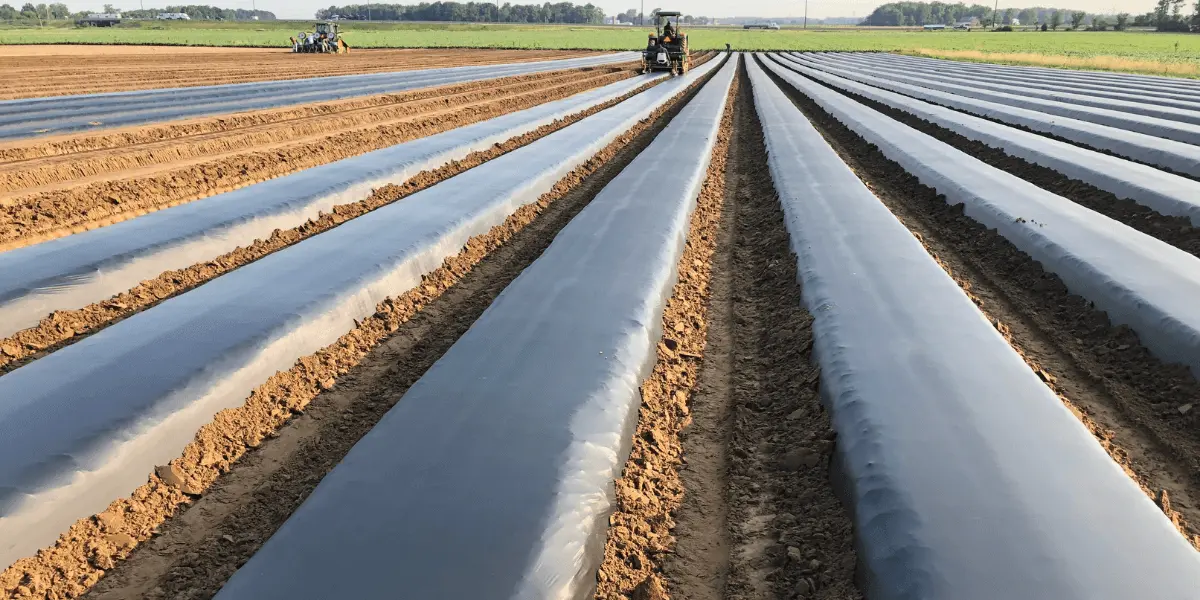
Moreover, A Guide to the Manufacture, Performance, and Potential of Plastics in Agriculture claims that plastic mulch increases soil temperature and nutrients, decreases evaporation, and protects plants from pests and rodents. Thus, you can use plastic mulch in your yard to keep rats away.
Cedar Mulch
It is also known as cypress mulch. Have you heard about chip or bark mulches? They come from cedar mulches. Because they include chemicals, chip or bark mulches naturally keep insects and rodents away. However, they contain insect-repelling oil (cedar oil) that helps to repel rats.
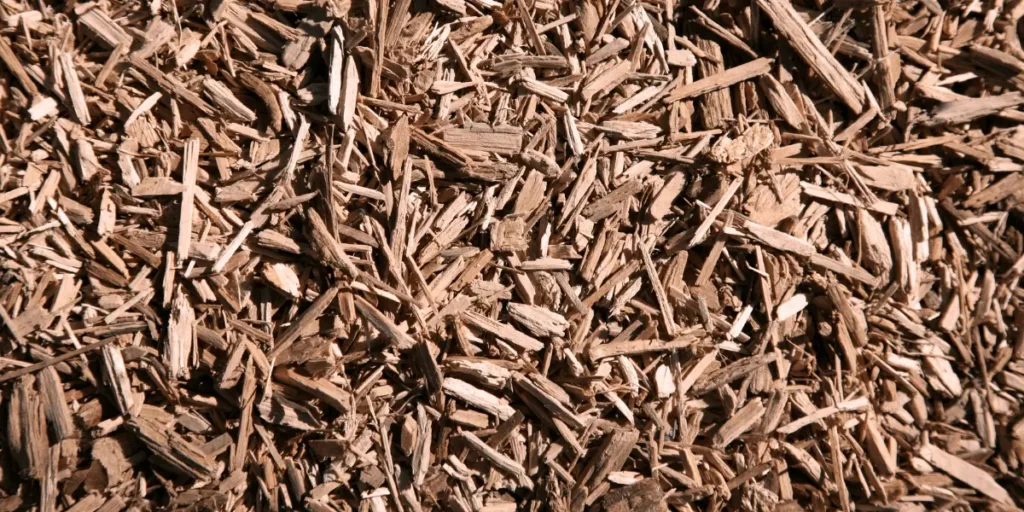
In addition to deterring rats, cedar and cypress also eliminate pests, including cockroaches, termites, and cloth-eating moths. To prevent rats from your yard, spread cedar mulches around your plants. The best thing about cedar mulch is that it lasts longer because it slowly decomposes.
Cocoa Bean Straw and Shells Mulch
Cocoa bean mulches are produced by removing hulk or shells of cocoa beans. They are best for repelling rats because they have a strong scent. Since rats are sensitive to smells, they don’t cope with the smell of beans and leave that place.
Additionally, it protects plants from fungus and other harmful ailments that might cause them to rot. On the other hand, cocoa bean shell mulch gives out a chocolate smell that keeps rats away.
Eucalyptus
Eucalyptus is a natural insect and rodent repellent. The eucalyptus tree, indigenous to southeast Australia, is utilized to keep insects or rodents away. Although its smell is soothing to humans, rats don’t like it. Furthermore, eucalyptus mulch maintains moisture and soil grade in your yard.
In addition to mulch, you can use eucalyptus oil to deter rats. To keep rats away, you can soak cotton balls in eucalyptus oil and place them along the way of rats.
What Other Animals Does Mulch Attract?
Several pests and insects attack plants and lawns, producing unfavorable outcomes. If you spread mulch in your garden, it attracts the following animals aside from rats.
Carpenter Ants
Carpenter ants adore wood, therefore, wood mulch attracts them to your house. They can eat solid wood, and they only do this to create a nest. Moreover, they build their nests in live and dead trees and fresh or decaying logs and stamps.
To prevent ants from constructing nests in wood mulch, you should make the mulch very shallow. However, if you live in a region where carpenter ants are common, you should avoid using organic mulch in your home.
Moreover, carpenter ants are frequently adept at smelling the fragrance of wood, which draws them to your home earlier than you might anticipate.
Earwigs
Earwigs are primarily nocturnal creatures that spend the day hiding in small, wet nooks before emerging at night to feast on various insects and plants. Mulch that typically consists of wood attracts earwigs. They use wood mulch for shelter or to build their nests.
Because wood mulch is reasonably priced, many people choose it to improve their home’s barrier look. Unfortunately, it attracts earwigs, and they start damaging your crops and flowers.
Termites
While the substance alone does not entice termites to the region, mulch piled 3 inches or deeper makes a cozy home for the insects. Near the earth, organic material layers store heat and moisture. This heavy mulch serves as a weatherproof haven for termites. Moreover, due to this damp environment, termites are enticed to explore the region by building tiny tunnels and searching for food.
Therefore, even if termites may not directly consume the mulch, its presence can undoubtedly improve the conditions in which a termite colony can begin or flourish.
Cockroaches
However, most people have no idea that mulch attracts cockroaches. In particular, the compounds found in mulches are what cockroaches want in any location with decaying substances. Numerous insects, including roaches, take advantage of this and create nests in mulch, which they then spread across your yard and eventually into your house.
Additionally, cockroaches draw toward moisture in wood chips and shavings. Thus, use mulches other than pine straw and bark shavings to keep cockroaches out of your home and garden.
Mosquitoes
Although mosquito species may dwell on huge, haphazard pieces of mulch, mosquitoes naturally prefer to hide under stamps and bushes during the middle of the day. Some mulch-related elements, including dampness, can make your yard more likely to draw mosquitoes.
Further, the damp mulch has enough moisture to make it a good place for mosquitoes to lay eggs. Even though every kind of mulch has benefits and drawbacks, some mulches are better for your plants than others since they act as mosquito repellents.
Spiders
In addition to mosquitoes, moisture attracts spiders. Spiders use moist mulch to get food and shelter. They love to reside in mulch to get abundant food. The wet mulch also serves as a spider’s ideal environment, where they may build their webs and nests.
Compared to other mulches, wood dust mulch typically draws spiders more readily. It is because it attracts insects that spiders eat. Consequently, spiders swarm in to enjoy abundant and free meals. Thus, you must take steps to repel spiders from your yard and gardens.
Do Rats Burrow in Mulch?
Yes, rats burrow in mulch. Rats gnaw on garden buildings and embellish while eating vegetation. The wood mulch and gravel help rats build nests under the piles. Thick mulch acts as heaven for rats.
Rats need constant access to food and water. They consume up to 2 ounces of food every day. Rats love to eat and chew wood and shrubs. That’s why; they love to burrow and create their nests in moist wood mulch because it offers them food, water, and shelter.
Above all, rats can dig tunnels that range in depth from one foot to six feet. You cannot find their nests because they frequently contain a primary entrance and a few small, harder-to-find ways.
Is it Ok to Put Mulch Around Your House?
Yes, you can put mulch around your house, but only if you are an expert at it or are doing landscaping. Although mulching the area surrounding your home keeps it well-kept and attractive, if you don’t apply it properly, it could lead to unwanted problems.
Mulch is mainly used because of its capacity to retain moisture and act as insulation against colder temperatures. If it is necessary to apply mulch around your house, use inorganic mulches like rubber or cedar mulch to prevent issues.
If you wish to utilize mulch around your house, you should put a layer of bricks between the foundation and the mulch to prevent the two from coming into touch.
How to Use Mulch to Prevent Rats?
Choosing the best mulch to keep pests and rodents away is not sufficient. For the best outcomes, you should understand how to apply these mulches. You can use mulch effectively to prevent rats by the below tips:
Use a Small Amount of Mulch
Contrary to popular belief, applying a sizable mulch pile has little effect. It is best to scatter a two-inch layer of fresh mulch in your yard or garden. Mulch deters insects and rats while preventing the growth of weeds and maintaining moisture. Moreover, a 2-inch covering of new mulch is more eye-catching than a huge mulch.
Finally, while mulching the garden, you should take precautions to prevent termites and other insects, and if you are using wood mulch, adopt preventive measures against fire hazards.
Discard Old Mulch
Before applying a new layer of mulch, you should remove the old one. After roughly six months, it is preferable to replace the previous layer. In this way, rats are unable to make their permanent residence. Additionally, your home’s entry is impacted negatively by the putrid scent of the old mulch pile.
Grow Rat-Repellent Plants in Your Yard
Plants like peppermint, cedar, cypress, and lavender deter rats. You can grow them in your yards to prevent rats or to protect your mulch sheet. Furthermore, you can use the essential oil of these plants to keep rats away. The best way to use oil is to soak cotton balls in the desired oil and then spread these balls around the mesh of mulch to prevent rats.
In addition to rats, these plants and oil deter snakes and other pests from your garden.
Install a Fence and Trap
The goal of fence installation is to keep rats and squirrels out of your garden. You can also build a fence to prevent mulch from entering your garden and lawn. For this purpose, you can use a path of bricks or stones or a metal or plastic fence.
Rats occasionally dig up the garden beneath the fence and make a way through it. Thus, to prevent rats from entering your yard, you should set a trap to capture them.
Place Mulch Aside
While spreading the mulch around your house, lay it away from the periphery. The ideal space between your home and the mulch should be approximately 6 inches. That makes your surroundings dry and keeps rats away from your house. Likewise, always use a rake to flatten the surface after adding the desired volume of mulch.
Wrapping Up
Mulches draw rats due to the optimal environment that their organic makeup creates. Understanding the kind of mulch that draws rats is the first step in preventing them from your garden and home.
After reading the above details, you have learned now which type of mulch attracts rats and how to keep rats away from them. All you have to do is choose the right mulch that requires minimal care and deters rats.
Above all, it would be wise to search your yard for indications of a rat tunnel. If you ignore it, this may result in a rat infestation.
References
Iqbal, R., Raza, M.A.S., Valipour, M. et al. Potential agricultural and environmental benefits of mulches—a review. Bull Natl Res Cent 44, 75 (2020). https://doi.org/10.1186/s42269-020-00290-3
Washington State University Extension fact sheet, 163E, Washington State University Extension; 12/2021
